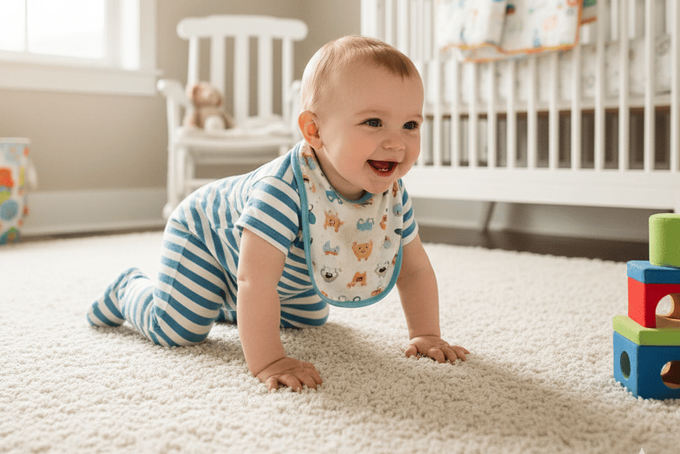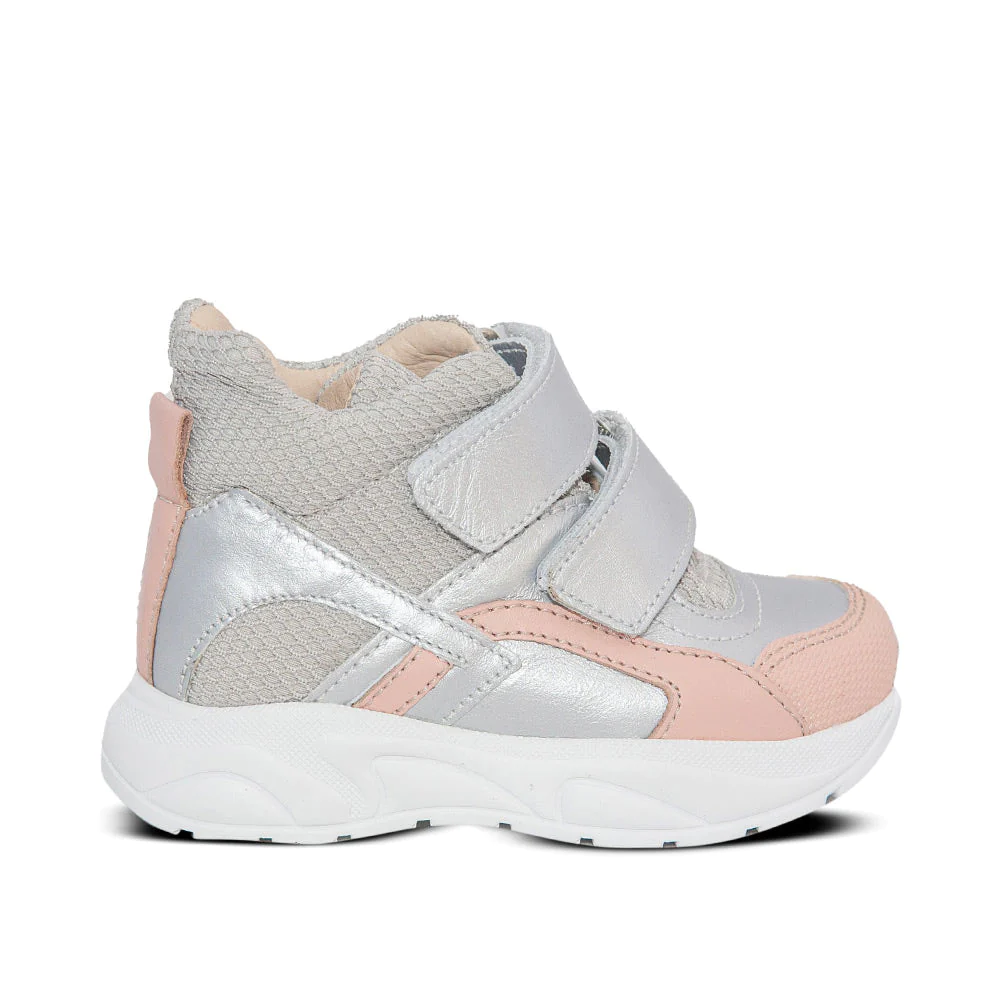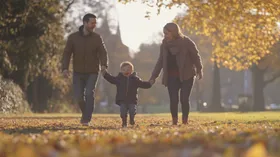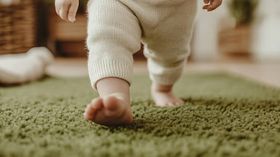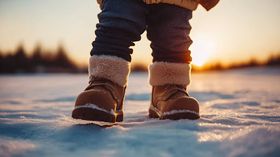When Do Babies Start Wearing Shoes? What Experts Say
Most babies don't need shoes until they've been walking independently for 6-8 weeks and are exploring outdoors regularly. Barefoot time strengthens foot muscles, builds balance, and supports natural arch development, making it the healthiest choice for early walkers at home.
Published October 24, 2025
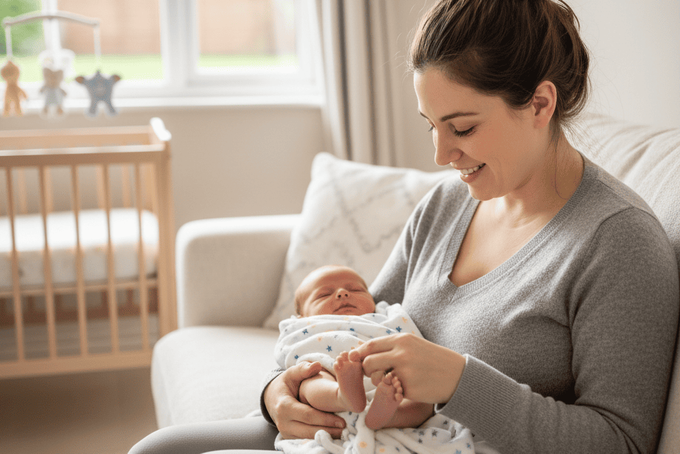
You're watching your baby pull up to stand or take those first wobbly steps, and suddenly you're wondering if it's time for shoes. Maybe grandma's asking when you'll get "proper" walking shoes, or you've seen other babies wearing tiny sneakers at playgroup.
The truth is that your baby probably doesn't need shoes yet. In fact, keeping them barefoot longer is one of the best things you can do for their developing feet.
When Do Babies Need to Wear Shoes
Most experts agree that babies should start wearing shoes around six weeks after they're walking confidently on their own. This gives their feet time to adjust to upright movement and lets early walking patterns stabilize naturally [1].
Babies typically start walking between 9 and 18 months. Long before that first step, they're building foot strength through crawling, pulling up, and cruising along furniture [2]. This exposes their feet to different pressures and surfaces, strengthening the muscles and ligaments they'll need for walking.
The key milestone isn't standing or cruising; it's confident, independent walking during outdoor play, where foot protection becomes necessary. Until then, barefoot is best.
Why Barefoot Time Matters for Babies
When your baby goes barefoot, thousands of nerve endings in their feet pick up information about the surface beneath them. This sensory feedback helps their brain learn balance, movement, and body awareness.
Shoes create a barrier between the foot and the ground, reducing this crucial feedback. Stiff or bulky shoes can actually slow down the development of walking confidence and balance skills your baby needs.
Going barefoot also strengthens the small muscles in your baby's flat feet, particularly those forming the foot arch. This arch is what sets human movement apart and supports everything from walking to running to jumping later on.
Research shows that barefoot time improves balance, coordination, and natural gait development [3]. Your baby's feet need to grip, flex, and move freely—just like their hands do.
When Can Your Baby Wear Shoes
Signs Your Baby Is Ready to Wear Shoes
If you're wondering when infants should wear shoes, look for these specific readiness signs rather than focusing on age alone:
- Your baby takes multiple independent steps without falling and uses walking as their main way of getting around instead of crawling
- They walk confidently on different surfaces like grass, pavement, or sand
- Most importantly, they're exploring outdoors regularly where foot protection becomes necessary.
- That's when shoes transition from unnecessary to helpful.
Signs Your Baby Isn't Ready to Wear Shoes As Yet
Even if your baby is pulling to stand or cruising furniture, they might not be ready for shoes. Here's what to watch for:
- They're not walking independently outdoors yet. Shoes protect feet; they don't teach walking or provide learning support.
- They're still cruising along furniture or standing with support. Introducing shoes too early can disrupt natural foot placement and limit the ankle mobility they're still developing.
- Their gait is unsteady with frequent falls or inconsistent stride patterns. They need more time building coordination before adding shoes to the equation.
- Their feet still look very soft and rounded without visible muscle definition. This means they're still in a pre-strengthening phase where barefoot time is crucial.
- If crawling or bottom-shuffling is still their preferred way of moving around, it's definitely too early for structured footwear.
The Problem With Babies Wearing Shoes Too Early
Introducing shoes before your baby is ready can actually interfere with healthy development. Here's how:
- Stiff or tight shoes limit natural foot movement, slowing down muscle and joint development. Poorly fitted shoes can gradually change the natural foot shape over time.
- Shoes with arch support at an early age prevent foot muscles from developing their own strength. This matters because strong foot muscles are what create stable, healthy arches naturally.
- Shoes constantly on the baby's feet dull the sensory input they need from the ground to develop balance and coordination. This makes it harder for them to learn efficient movement patterns.
- Babies who always wear shoes might stomp or walk with an unnatural waddling gait instead of using their toes to feel and grip the ground.
- Heavy or stiff shoes can even delay standing and first steps.
The most concerning issue? When babies struggle to move well in shoes, they can become frustrated or hesitant about walking altogether.
When Can Babies Wear Shoes Safely
Once your baby is walking confidently, shoes become important for specific situations:
- Outdoors on hot pavement, cold concrete, rocky paths, or rough terrain, where bare feet could get injured or uncomfortable.
- Public places like daycares, cafés, or community centers where hygiene or safety rules require footwear.
- Cold or wet weather, when bare feet would be uncomfortable or lead to problems like chilblains.
Expert Note: Even after introducing shoes, your baby should still spend significant time barefoot at home. This continues building foot strength, balance, and natural arch formation throughout their early walking years.
How Much Time Should Babies Spend Wearing Shoes
If you're wondering whether your baby should wear shoes regularly, the answer is no. Even after that 6-8 week post-walking milestone, prioritize barefoot time whenever safe and appropriate.
If you're indoors at home, let your baby go barefoot as much as possible. This strengthens muscles and helps build balance and coordination in ways shoes cannot.
Encourage barefoot activities like running or chasing games, jumping on soft surfaces, and single-leg balance play or tiptoe walking. These all support parent-child bonding and healthy arch development to prevent flat feet, promoting full-body coordination.
Think of shoes as protection for specific situations rather than something your baby wears all day. The more barefoot time they get during these critical development years, the stronger and healthier their feet will be long-term.
What to Look for in Your Baby's First Shoes
When your baby is ready for shoes, choosing the right features matters significantly. Here's what supports healthy foot development:
- Flexible, lightweight soles let feet move naturally and bend easily. Test this by holding the shoe at both ends; it should flex at the ball of the foot.
- A wide toe box allows toes to spread and grip naturally. Your baby's toes shouldn't feel squished or cramped.
- Soft, breathable shoes made of materials like leather or canvas prevent sweating and rubbing. Avoid synthetic or plastic uppers that trap moisture.
- Adjustable fastenings with buckles, Velcro, or laces ensure a secure fit and accommodate daily foot swelling. They also help your toddler learn to put on themselves.
- Non-slip rubber soles provide traction and prevent slipping on smooth surfaces while still maintaining flexibility.
- Room for growth means about a thumb-width of space at the toe when your baby is standing. Feet grow quickly, so check fit every few weeks.
The goal is to find shoes that protect without restricting natural movement. They should feel like an extension of barefoot walking rather than something heavy or rigid.
The Issues With Babies Wearing Hand-Me-Down Shoes
Many families pass down clothes between children, but shoes are different. Used shoes have already molded to another child's unique foot shape and walking pattern.
When your baby wears pre-worn shoes, their feet are forced into someone else's wear pattern. This can cause discomfort, strain on developing joints, and even contribute to long-term foot problems.
The cushioning, support, and tread in used shoes may look fine, but are often already worn down. This means less shock absorption, reduced support, and increased slip risk for your baby.
Used shoes can also harbor fungi, bacteria, and viruses in the warm, damp environment inside the shoe. Even without visible signs of infection, shoes can carry athlete's foot spores, plantar wart viruses, and bacteria, causing skin irritation.
Your baby needs properly fitted, supportive shoes tailored to their own movement patterns. The truth about hand-me-down shoes is that they hinder healthy development during critical growth years.
Common Myths About When Babies Need Shoes
1. Myth: Babies need shoes to learn to walk
Babies learn to walk best barefoot. Shoes are only needed once they're walking confidently outdoors for protection from rough or dirty surfaces.
2. Myth: Soft-soled shoes delay walking
Soft, flexible soles are actually the next best thing to barefoot. They let your baby move naturally while providing protection when needed.
3. Myth: Shoes help shape a baby's feet or form arches
Babies are naturally born with flat feet in their early years because of fat pads in their arches. This is completely normal and resolves as muscles develop through walking. Shoes don't shape feet; in fact, stiff or tight shoes can interfere with natural development.
4. Myth: Babies need shoes when they start standing
Standing and cruising don't require shoes. Barefoot helps babies learn balance and strengthen their feet naturally. Shoes are only needed for independent outdoor walking.
Expert Tip: Here's a simple way to know if your baby is ready for shoes: observe how they move in socks with grips versus barefoot. If your baby is confidently walking indoors in grippy socks without slipping or hesitating, but struggles or refuses to walk on outdoor surfaces like grass, pavement, or rough ground, that's your sign they're ready for protective footwear.
However, if they're still unsteady indoors even with grippy socks, they need more barefoot strengthening time before introducing shoes.
Special Considerations Before Babies Start Wearing Shoes
If your baby has hypermobility, flexible flat feet, or delayed standing, the timeline for shoes doesn't change. They still shouldn't wear shoes until they can walk confidently outdoors.
It's normal for new walkers to have feet wide apart, appear bow-legged or knock-kneed, or walk with toes turned in or out. These patterns usually correct themselves as your child grows and gains strength.
Shoes are meant to protect, not to support or "fix" foot position in early walkers. Introducing shoes too early, especially indoors or before independent walking, can actually slow foot development.
Babies need barefoot time to build foot muscles, improve balance, and develop body awareness. Even with slight concerns, this principle doesn't change.
For children with significant developmental conditions like clubfoot or cerebral palsy, footwear serves different functions and should be guided by a physiotherapist or orthotist based on individual needs.
Supporting Your Baby's Foot Development
Understanding when do babies start wearing shoes means recognizing that barefoot time is essential for healthy development. Your baby's feet are building strength, balance, and coordination with every barefoot step they take.
Shoes become necessary around 6-8 weeks after independent walking begins, primarily for outdoor protection. Even then, maximize barefoot time at home to continue supporting natural development.
First Walkers designs shoes specifically for these developmental needs during those critical early walking months. Our Rex Roamers and Flopsy Rosy sandals work beautifully for warm weather, allowing toes to breathe and move freely while providing grip for new walkers.
References
Wang, Y., Jiang, H., Yu, L., Gao, Z., Liu, W., Mei, Q., & Gu, Y. (2023). Understanding the role of children’s footwear on children’s feet and GAIT Development: A Systematic scoping review. Healthcare, 11(10), 1418. https://doi.org/10.3390/healthcare11101418
Learning to walk. (n.d.). https://cambspborochildrenshealth.nhs.uk/moving-and-being-active/early-years-movement-skills-and-development/learning-to-walk/
Hospodar, C. M., & Adolph, K. E. (2024). The development of gait and mobility: Form and function in infant locomotion. Wiley Interdisciplinary Reviews Cognitive Science, 15(4). https://doi.org/10.1002/wcs.1677
Disclaimer: First Walkers' information is intended for educational and informational purposes related to toddler footwear and feet. We encourage you to consider individual circumstances and consult qualified orthopaedists about specific conditions.
FAQs
Do babies need shoes before they start walking?
No. Babies don't need shoes before walking independently. Barefoot time strengthens foot muscles, builds balance, and supports natural arch development during the crawling and cruising stages.
Can shoes help my baby learn to walk faster?
No. Shoes don't help babies learn to walk and may actually slow the process. Babies learn to walk best barefoot where they can feel the ground and develop balance naturally through sensory feedback.
What age do most babies start wearing shoes?
Most babies start wearing shoes around 10-20 months old, typically 6-8 weeks after they begin walking independently. The timing depends on when they're confidently walking outdoors rather than a specific age.
Should my baby wear shoes indoors?
No. Keep your baby barefoot indoors as much as possible. Indoor barefoot time continues building foot strength, balance, and coordination even after you've introduced shoes for outdoor use.
How do I know if baby shoes fit properly?
Check for a thumb-width of space at the toe when standing, ensure the heel doesn't slip, and watch that fastenings close comfortably without straining. Your baby's toes should wiggle freely with no red marks after wearing.
